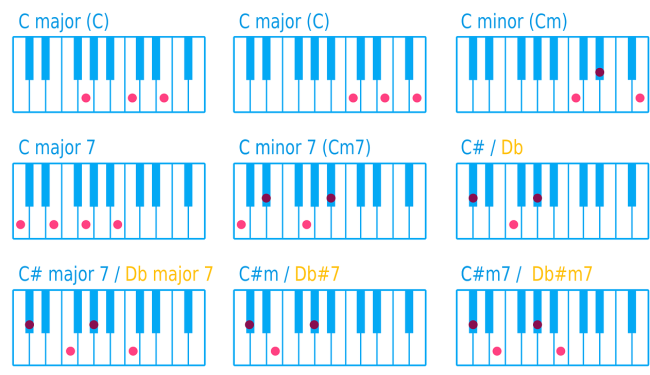Estimated reading time 4 minutes
Table of Contents
Introduction
Have you ever had trouble coming up with songwriting ideas? A creative dry spell can be one of the worst things for a songwriter to have happen. Read more to learn how to jumpstart the creativity in your songwriting.
I remember my worst dry spell back in 1988. I didn’t have any trouble coming up with music, but I had hit a big wall with my lyric writing. No matter what I tried to do I could not come up with good topics to write about. My next ten years were spent figuring out how to jumpstart inspiration.
One of the best pieces of advice I have ever heard of on the subject of jumpstarting musical ideas came from Jimmy Kachulis. I saw Kachulis, a Berklee College of Music songwriting professor, at a Boston Songwriters Workshop event back in 1997. He suggested that when you get stuck you can write new material to hit songs to get the juices flowing.
This article uses musical terms. For definitions, see the Glossary at the end of the post.
![music of words in songwriting, (i.e., the music of the words) impacts your songwriting, music of words into your songwriting – writing lyrics – jumpstart the creativity in your songwriting – Pronoun Definition & Meaning: Unlock Your Knowledge [Video] music of words in songwriting, (i.e., the music of the words) impacts your songwriting, music of words into your songwriting - writing lyrics - jumpstart the creativity in your songwriting - Pronoun Definition & Meaning: Unlock Your Knowledge [Video]](https://successmusicstudio.com/wp-content/uploads/elementor/thumbs/write-notebook-pen-4491416-pfbdir1n5uhnxnrhuuntmia8k3zl5a5jrc5uqv0bos.jpg)
Writing New Lyrics to a Hit Song to Jumpstart the Creativity in Your Songwriting
Your first exercise for jumpstarting the creativity in your songwriting, take a melody from a hit song and write new lyrics to it. Once you’ve come up with the lyric, dump the original melody and write a new melody of your own.
Writing lyrics to a hit melody can also be a great learning tool. It allows you to subconsciously absorb the rhythm, flow, and form of the song.
Conversely, you can write a new melody to preexisting lyrics. Then, write your own lyrics to the melody you’ve just created. It gives you a place to start when you write to a preexisting song. That way you don’t come into the process totally cold.
In other words, it gets the ideas flowing. However, you won’t be stealing, because you’ll only use the material you’ve written.
Writing a New Melody to Preexisting Chords to Jumpstart the Creativity in Your Songwriting
Writing a Melody to the Chords from a Preexisting Song
You can also jumpstart the creativity in your songwriting by writing a new melody to the chords from another song. This works really well when you play the chords to a different rhythm. That way no one will know for certain what song you took the chords from.
However, when you write a new melody to another song’s chords, you don’t have to slavishly keep to the preexisting chord structure. Use the progressions to get the juices flowing, but don’t box yourself in. Follow where your ear tells you to go.
How to Pick the Chord Progression
When picking chord progressions to write over, pick ones from songs you love and that move you. Much of the power of the chord progression will often transfer to your melody. The chords will have a certain color to them regardless of what melody notes get sung over them.
Writing over new chords can also help you get out of any melodic ruts you may be in. A chord progression will naturally limit the number of notes, because only three or four notes will work over each chord.
If you write over the same chords all the time, you’ll have a tendency to fall into melodic patterns. This explains why so many blues melodies sound similar to each other.
Writing over a new chord progression can help you breakout of stale melodic patterns. Writing over chords from a style you don’t usually write in can push the process even farther.
Similarly, if you write in verse/chorus form all of the time, try writing in AABA form every third or fourth song. Getting into ruts can lead to stale writing. Therefore, breaking out of ruts can help jumpstart the creativity in your songwriting.

Brainstorming Titles to Jumpstart the Creativity in Your Songwriting
What’s the third exercise for jumpstarting the creativity in your songwriting? You can free-associate ideas from existing song titles.
Go through CDs, song books, or search online, and brainstorm ideas for songs. If someone has written a song called “Cinema”, you might come up with a title like “At the Movies.”
Try to keep your title as original as possible so that it will not be confused with the title of any other song. With this exercise you are just trying to get the juices going, not steal someone else’s title.
Only twenty titles out of a hundred will be worth developing. Therefore, brainstorm tons of titles against future need and keep them in a folder.

Conclusion
The last suggestion for jumpstarting the creativity in your songwriting is to keep a small notebook for lyric ideas. If you think of a title or a line, or if you hear someone say something witty, write it down for future use.
Hank Williams, Waylon Jennings, Ben E. King, and Eddie Snyder all used to keep notebooks. It can be one of the best ways to stave off creative slumps.
I hope you never have a dry period like I had in the late ’80s. If you use the strategies described above, it will go a long way toward letting you have a great songwriting experience. Have fun writing!
© 2021 Geoffrey Keith
Join me for in-person or online lessons today!
Glossary
How to Play the Frustrating B Minor Guitar Chord
Do you have a tough time playing the B minor guitar chord? Are you frustrated and need some help? B minor is one of the most awkward guitar chords to play. However, there are some tricks that can help you master it. Keep reading “How to Play the Frustrating B Minor Guitar Chord” to learn how to best play the three most popular versions. Estimated reading time 3 minutes.
Read MoreHot Tube Amps Versus Cool Recording Studio Modelers
Have you been looking at gear and want to know whether tube amps or amp modelers are the better option for your guitar sound? Tube amps are old school and amp modelers are state of the art. However, each has its own advantages and disadvantages. Keep reading “Hot Tube Amps Versus Cool Recording Studio Modelers” to learn the benefits of each. Estimated reading time 3 minutes.
Read MoreHow to Play the Sad Sounding D Minor Chord
Do you want to know how to play the open D minor guitar chord? Do you want to know why it sounds sad? Minor chords have a sweet, haunting sound. Open D minor has medium difficulty, but with the right fingering strategies, it’s not that hard to play. Keep reading “How to Play the Sad Sounding D Minor Chord” to find out how to best play open D minor. Estimated reading time 3 minutes.
Read MoreJam Like a Rock Star with Open E Tuning
Are you tired of your band sounding out of tune? Can’t get the classic rock sound when jamming with your group? Read more to learn how to jam like a rock star with open E tuning. You will also learn the song “Gimme Shelter.” Estimated reading time 4 minutes.
Read More




